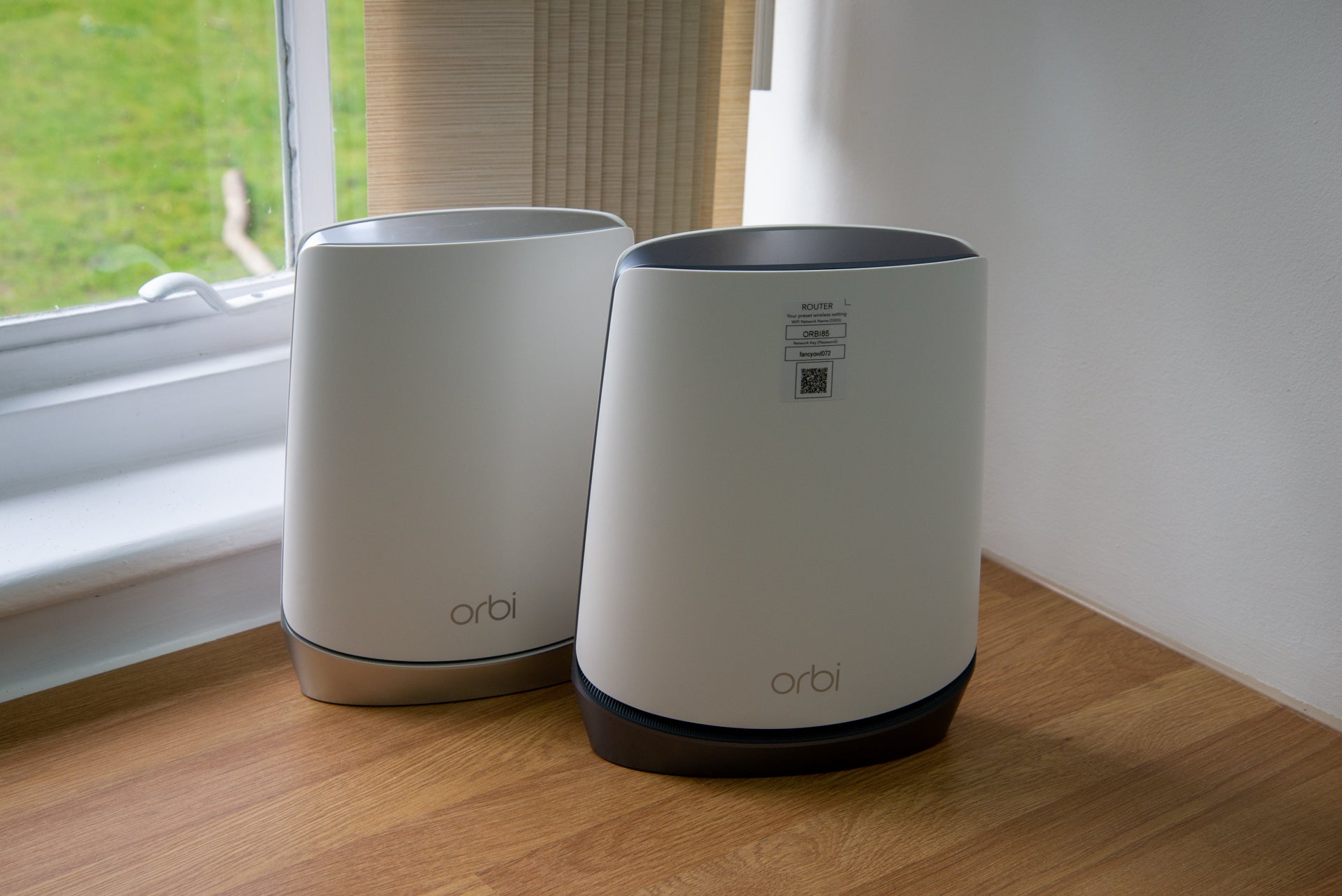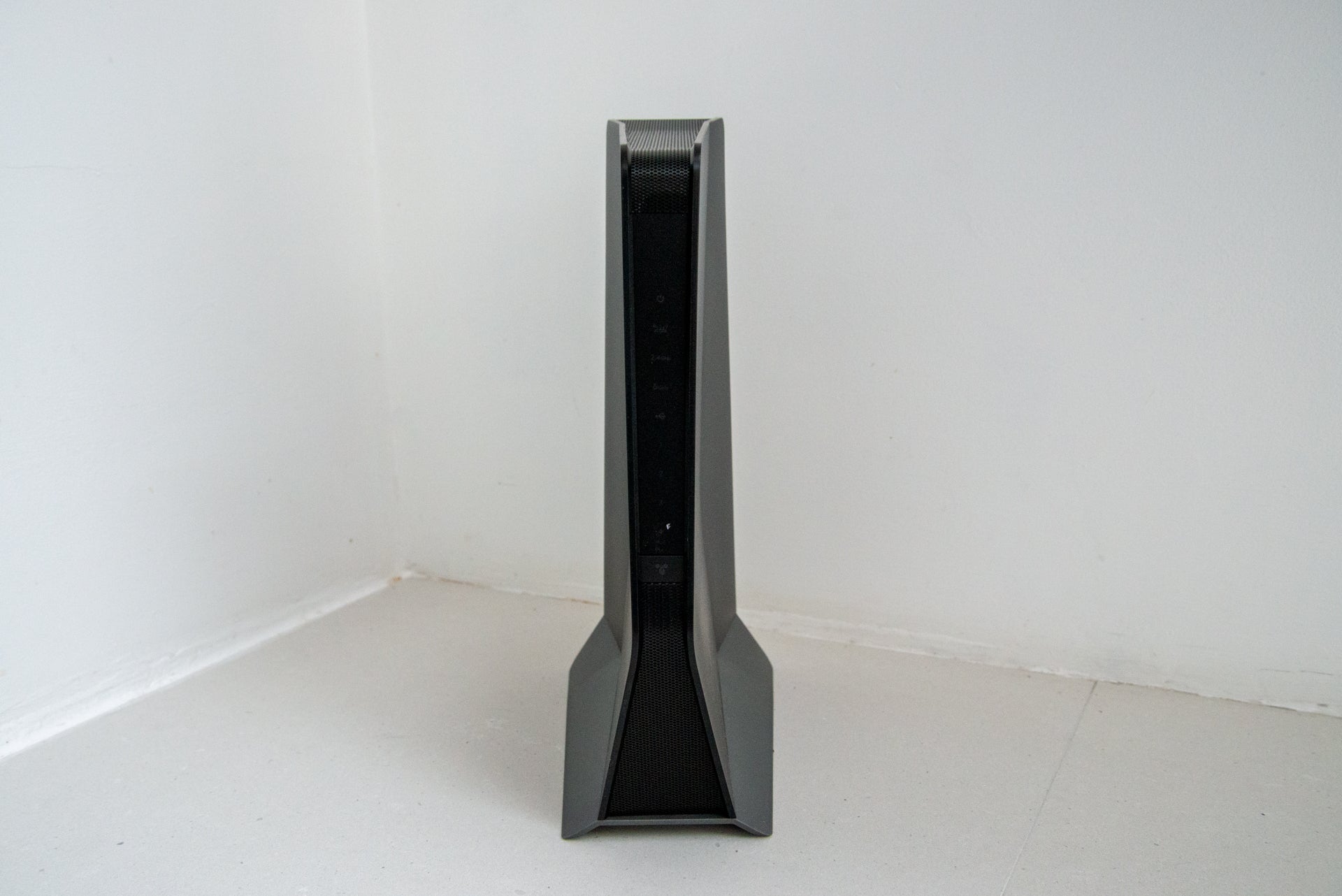Netgear Orbi 5G Tri-Band WiFi 6 Mesh System (NBK752) Review
Wi-Fi 6 and 5G all in one system
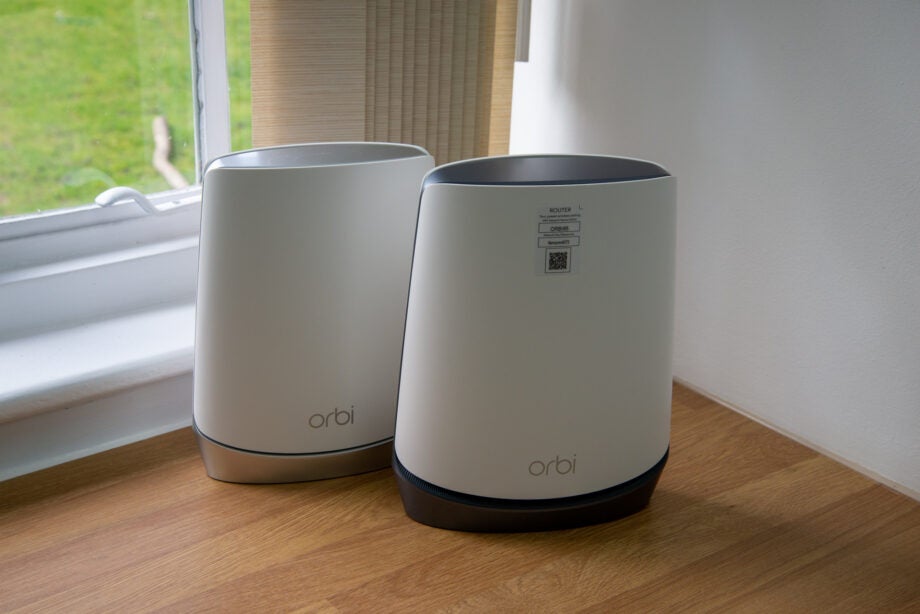

Verdict
Combining Wi-Fi 6 with 5G, the Netgear Orbi 5G Tri-Band WiFi 6 Mesh System (NBK752) offers excellent wireless coverage backed up by the power of 5G for internet access: either as the main connection or as a broadband backup.
This system is a little more expensive than regular Orbi Wi-Fi 6 systems, but the combination of 5G and mesh is well priced compared to buying individual components.
Pros
- Supports 5G
- Excellent parental controls and security
- Reliable Wi-Fi speeds
Cons
- Faster Orbi Wi-Fi 6 mesh systems available
Availability
- UKRRP: £1099
Key Features
- Wi-FiThis is a Wi-Fi 6 router that supports four streams of data for each router/satellite
- 5GThis system supports 5G (and 4G) data SIMs
- SecurityOptional parental controls and security are available via subscription
Introduction
Given how important the internet is to us, particularly for those working at home, having a backup for when broadband may go down is crucial. I’ve seen Netgear tackle such scenarios before with the Netgear Orbi 4G LTE (LBR20) router, but the company is back with a bigger and better product, the Netgear Orbi 5G Tri-Band WiFi 6 Mesh System (NBK752).
Supporting Wi-Fi 6 and 5G, this mesh system pulls in two of the latest networking technologies, making it an excellent all-round system for those times you need reliability and speed.
Design and Build Quality
- Supports cellular and wired broadband
- Decent range of Ethernet ports
Open up the Netgear Orbi 5G Tri-Band WiFi 6 Mesh System (NBK752) and you’ll see that it’s pretty much business as usual – this kit look similar to previous Wi-Fi 6 Orbi systems.
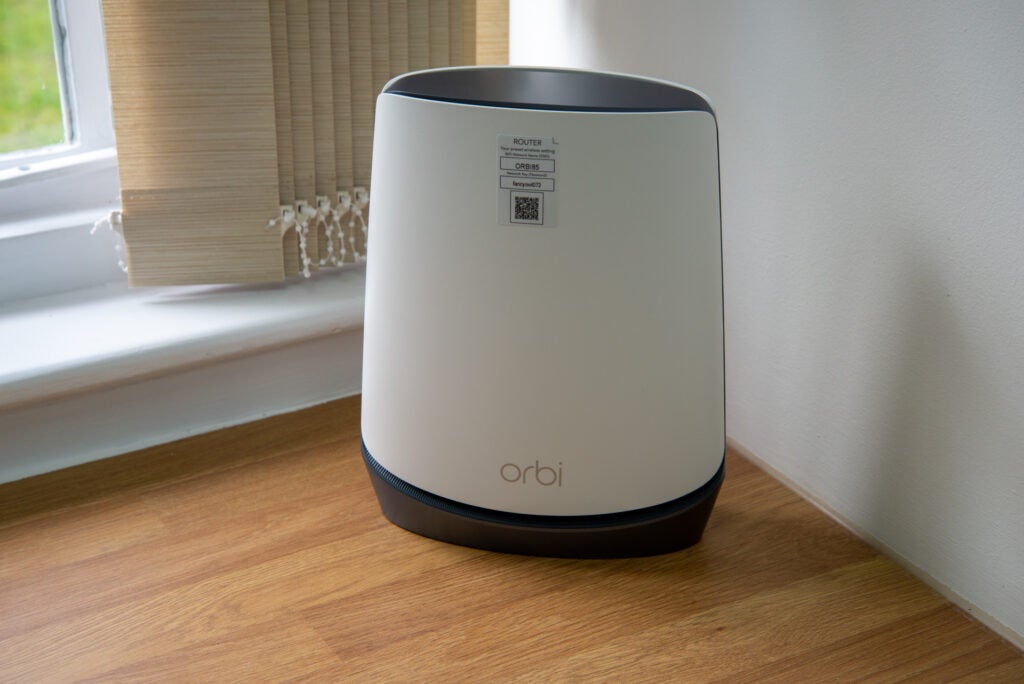
This particular package includes one router and a satellite, although you can buy it with two satellites (NBK753). While the main system is based on the existing RBK752 Orbi system, the router here is new.
Spin it around and you’ll see the difference around the rear: there’s a SIM card slot, so you can connect to the network of your choice. This makes Netgear’s system more flexible than with the Vodafone Broadband Pro system, which connects to the Vodafone network only.
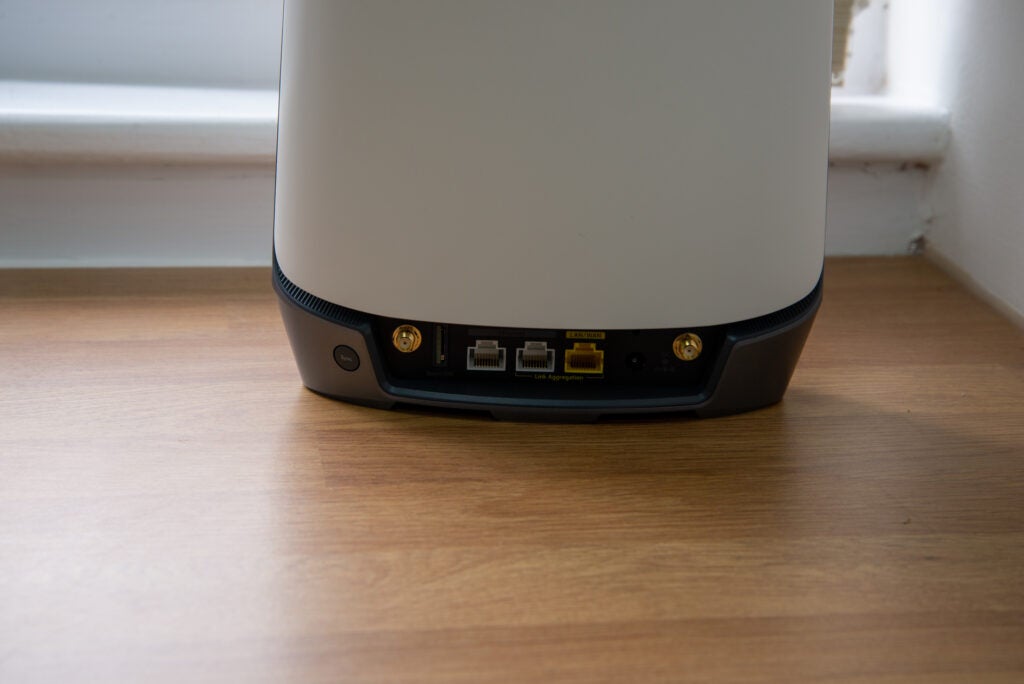
While the Orbi system has antennas built-in, you can connect external ones using the ports at the back. That will help to boost signal quality, without having to move the router to somewhere inconvenient.
The minor downside of having mobile data built-in is that the router has fewer Gigabit Ethernet ports than the regular RBK752 system. Here, you get two Gigabit Ethernet ports for devices, and a Gigabit Ethernet WAN port. The latter can be used for connecting to standard broadband or, if you’re going 5G only, you can use it as an additional LAN port.
It’s a shame that there’s no faster 2.5Gbps Ethernet port, as included on the higher-end Orbi RBK852 system.
The satellite is the same as on the regular RBK752 system. This has two Gigabit Ethernet ports for wired devices.
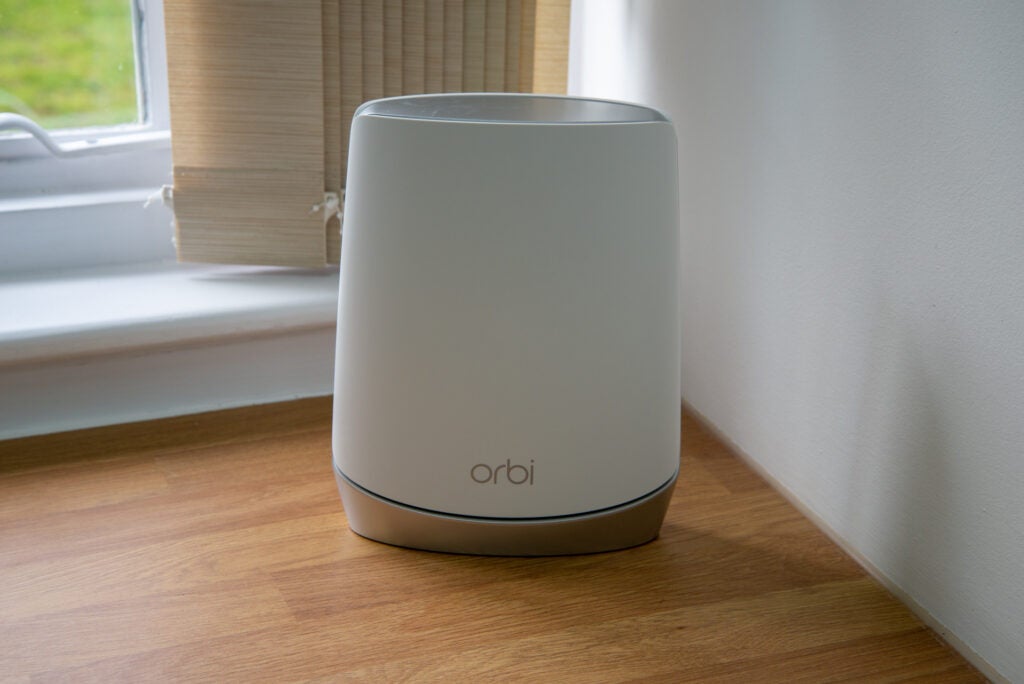
Features
- Excellent parental controls and security
- App delivers remote control
- Compatible with existing Wi-Fi 6 satellites
Since this is an Orbi system, the control and range of features on offer is very similar to other products in the range. Initial configuration is through the Netgear Orbi app, which also delivers remote control of your system.
During set-up, the app takes you through the process of installing a SIM into the router, setting up the satellite(s) and configuring a secure wireless network. This Wi-Fi 6 system is compatible with the RBS850 satellites from the more powerful system, as well as the RBS750 satellites; you can’t use the satellites from the Orbi RBKE963 Wi-Fi 6E system.
In most cases, satellites will be connected wirelessly, although you can connect using Ethernet if you prefer (a wired backhaul).
With a SIM installed, you can choose to have the system run from this all of the time, or to use it as a backup in case the main wired broadband fails.
From the app you can control the basics, including toggling the guest network on and off, and changing the wireless network’s name and password. If you want to take control of the channels on which the network runs, you have to use the web interface. Likewise, while the Orbi should work with your chosen network automatically, the web interface lets you set the specifics of the mobile connection.
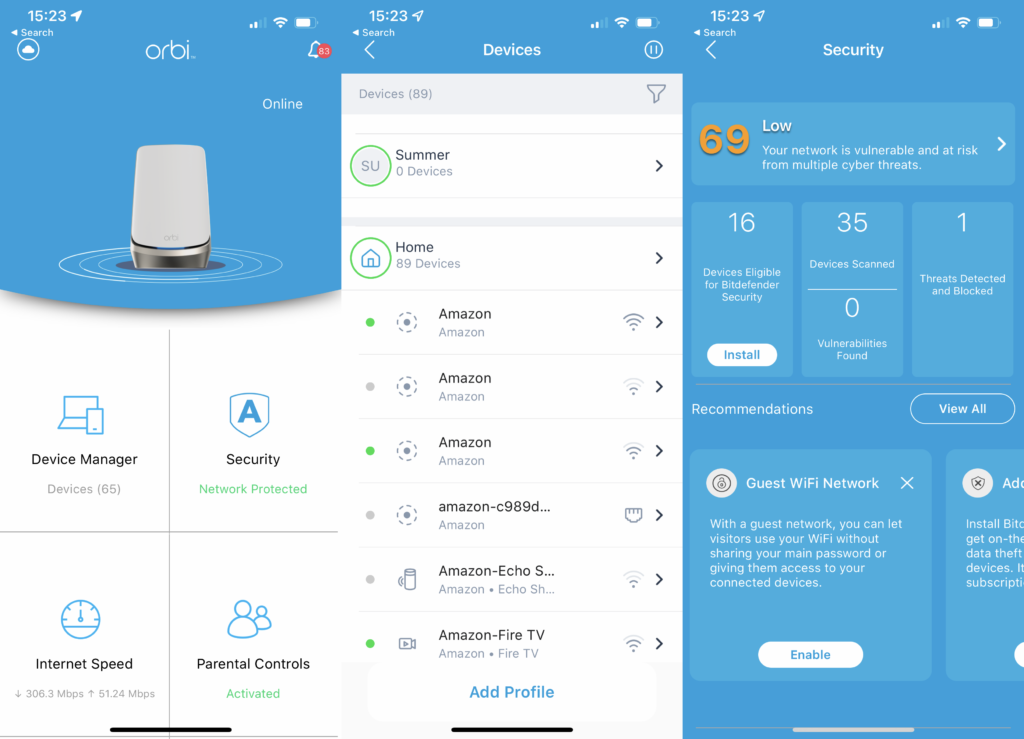
Parental controls are built into the router. With the free version of the software, you can create profiles for each user and assign them devices on your network. That lets you pause the internet for specific users across all of their devices. Pay for the higher tier (£6.99 a month or £49.99) and you can set web filtering, total usage times and bedtimes for each user.
Netgear Armor is a separate paid-for service (£84.99 a year) that adds network-wide spam and attack protection, plus you get downloadable security software for all computers and mobile devices.
Connecting devices have a two-stream 2.4GHz network running at 600Mbps, and a two-stream 5GHz network running at 1200Mbps per satellite or router: that’s half the bandwidth of the higher-end RBK853 system.
The connection between satellites, if you’re not using Ethernet, is a four-stream 5GHz network running at 2400Mbps. This is the same as on all Wi-Fi 6 Orbi devices. It’s this backhaul that makes the system compatible with the faster RBS850 satellites.
Overall, the eight total streams of networking for clients is still a good number, particularly since these will be spread out through your home.
Performance
- Fast cellular speeds where available
- Excellent range
This system’s performance is similar to that of the RBK752. Testing with a 2 x 2 network card, I saw speeds at close range of 442.92Mbps. Moving 5m away to the first floor, I saw speeds of 319.54Mbps; 10m away on the second floor, speeds reached 284.78Mbps.
That’s a little behind the pace of the RBK852 system, which does better at range, and the RBKE963, which is faster still. However, these results are still very good, and the most important thing is that this Orbi system is super-reliable; it delivered a strong signal all around my home.
Cellular speeds depend on where you live and the signal available to you. In a 5G area, I’ve seen download speeds of 150Mbps and faster; if you don’t have 5G where you live, you’ll drop down to 4G speeds. Again, the results you see will depend on the network availability.
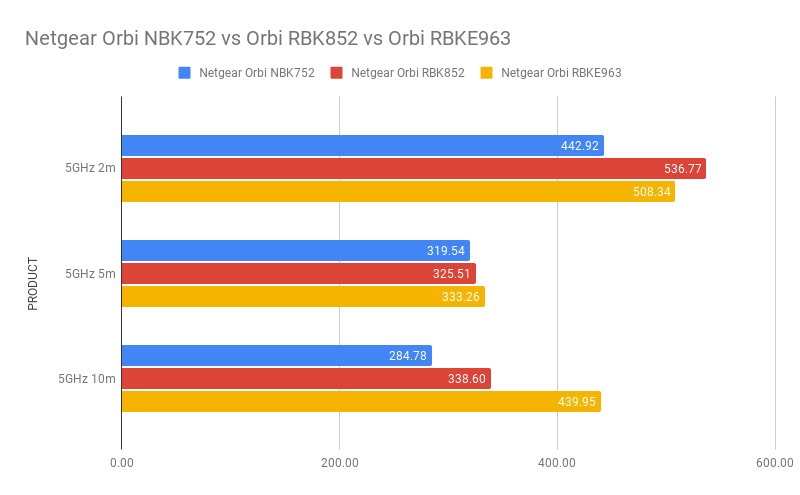
Latest deals
Should you buy it?
If you want the power of 5G (as a backup or main internet source) combined with a reliable and fast mesh system, the Netgear Orbi 5G Tri-Band WiFi Mesh System is the one to buy.
If you’re not so bothered by mobile data, you can buy a cheaper Wi-Fi 6 system that delivers improved performance.
Final Thoughts
The Netgear Orbi 5G Tri-Band WiFi 6 Mesh System (NBK752) brings the best of Wi-Fi and cellular technology into a single system. If you want to run from a 5G connection, or you want regular broadband with the option of mobile backup, this system delivers.
It’s a little more expensive than the RBK852 system, although you’re still getting good value compared to buying a dedicated 5G router and adding a mesh system on top. That said, if 5G backup isn’t a priority, then opt for the regular RBK852 for its superior Wi-Fi performance.
How we test
Unlike other sites, we test every wireless router we review thoroughly over an extended period of time. We use industry standard tests to compare features properly. We’ll always tell you what we find. We never, ever, accept money to review a product.
Find out more about how we test in our ethics policy.
Used as our main wireless router for the review period
We throughput test all wireless devices using the same equipment in the same locations so that we have accurate comparisons
FAQs
Yes, you can add any Wi-Fi 6 Orbi satellite to the system, but not the newer Wi-Fi 6E products.
For anything other than basic control, you need to pay for the monthly subscription.
It supports all 4G and 5G networks.

